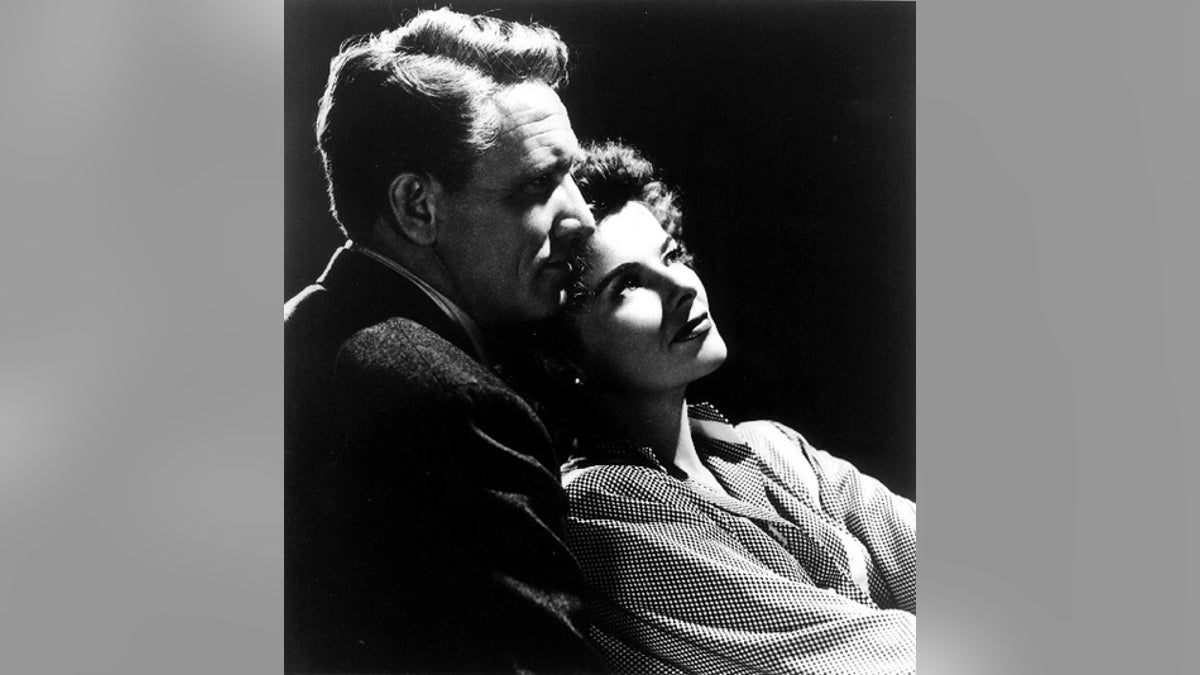
Actress Katharine Hepburn is shown with actor Spencer Tracy in a 1945 photo from the film "Without Love." (REUTERS/CORBIS)
Saturday marks 50 years since the passing of Hollywood icon Spencer Tracy.
It also marks a christening of sorts for this column, intended, among other purposes, to spotlight some of Hollywood’s warts – its hypocrisies. Of which there are plenty.
But, God knows, Washington, a.k.a. “Hollywood for ugly people,” has hypocrisy and warts of its own on full display in recent days. (Did I hear that right? Loretta Lynch wanted to shut down the Comey investigation of Hillary’s email? “Say it ain’t so, Joe.” “I’m shocked, shocked to find that gambling is going on in (Casablanca).”
Now for a blessed respite, from an unusual place – Hollywood – offered by the anniversary of Tracy’s passing.
“Spence,” as his good friends called him, was about the real: Raw emotion. Raw power. Rank injustice. Fighting to right wrongs through the passion of his performance that helped compel sometimes radical change upholding the dignity of man and woman.
It was bred into him. You see, his father always wanted him to be a priest. But his vocation was that of actor, pouring his heart and mind into his work, while ministering to the soul of America in classics such as "San Francisco" (1936), "Captains Courageous" (1937), "Boy’s Town" (1938), "Inherit the Wind" (1955), "Judgment at Nuremberg" (1961), where Tracy – as priest, fisher, educator/surrogate father, lawyer, judge, among many other iconic roles – dispensed counsel and advice as only he could.
Consider that classic scene in Boy’s Town with “Pee Wee,” where “Fr. Flanagan” (Tracy) gently guides him to be honest, contrasted with the “tough love” scene with “Whitey” (Mickey Rooney). Or "Judgment at Nuremberg," where, to preserve civilization, Tracy, as judge, exposes the hideous face of systemic, government-sponsored evil. Or "Inherit the Wind,"where his character opens up narrow minds.
But, make no mistake, in real life, Spence was a character-and-a-half – a bad boy wrestling with his demons. Which is why Hollywood sometimes resisted giving him his due. Yet, it was those very demons that made him the acting legend he was.
As fellow icon Gary Cooper said, a player does not make himself but is shaped by external forces.
What showed up on the screen came from Spence’s life – Coop’s too, and that of all great actors. A rough and tumble cauldron of emotion, shaped into something mighty fine.
Spence had these forces coursing through him destructively so – inside and out. When not rendering brilliant performances as a healing salve for the nation, he was more often than not drinking it over.
His first “big drunk,” his good friend and fellow actor Pat O’Brien said, came after he and his wife Louise discovered their 10-month-old baby boy, John, was deaf.
Spence wrongly believed his son’s disability was God’s punishment for his profligacy. And, he was racked with guilt. But, in the way God transforms suffering, it was John’s loss that made Tracy the acting legend he was – impelling him as it did to overcome a bent toward the easy life and to give his craft all he had.
He wanted John to have the best. Louise ended up starting a clinic for deaf children, initially funded with Spence’s golden Hollywood earnings.
Named after their son, the clinic emphasized speech, language and listening skills so these beautiful children – and, make no mistake, John was a gem! – could fully participate in the adult world when the time came.
Spencer Tracy’s last film, wrapping just days before he died on June 10, 1967, tapped into seismic forces playing out on the social and cultural landscape.
It was a historic moment where the wound of racial injustice was finally being cauterized while catalyzing riots, assassinations, and civil unrest as part of the healing.
The film was a watershed, starring also Sidney Poitier, as blacks took their rightful, more expansive place in the cinematic landscape. [Poitier had won the Best Acting Oscar for Lilies of the Field (1963) just three years prior.]
Fifty years later, so many other injustices have found their moment not unlike 1967. Especially those that fall under the broad rubric of the “culture of death,” about which St. John Paul II, who did have the vocation to be a priest, after initially trying acting, spoke so eloquently and movingly. Treating old and sick like, in the words of a loved one in her waning days, “a pile of junk,” and giving them a heave ho into eternity. The culture has decided they are expendable. Well, they aren’t. And, it’s a scandal they are treated otherwise.
Just another just cause that Tracy, were he alive today, would have helped to cauterize while stirring the souls of Americans: Where the dignity of man – what people feel, the nobility for which they are born, though they may start life in a slum – not a pile of cash, is the paramount consideration.




















